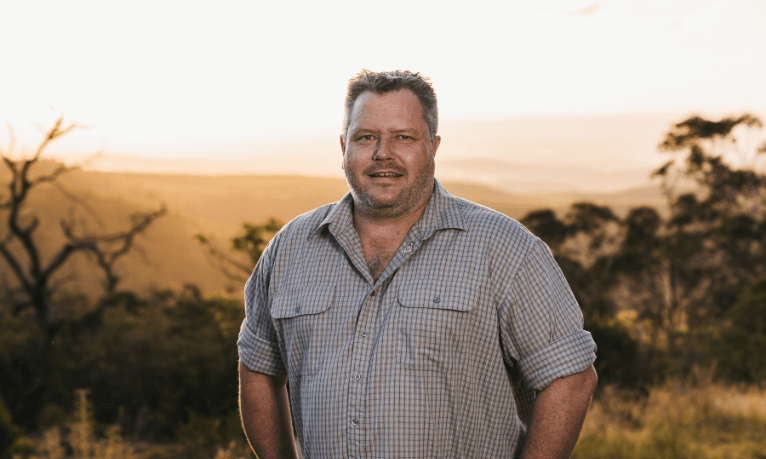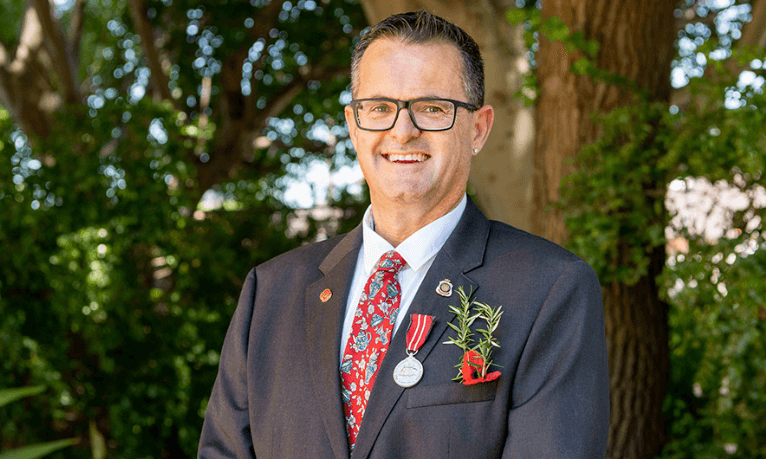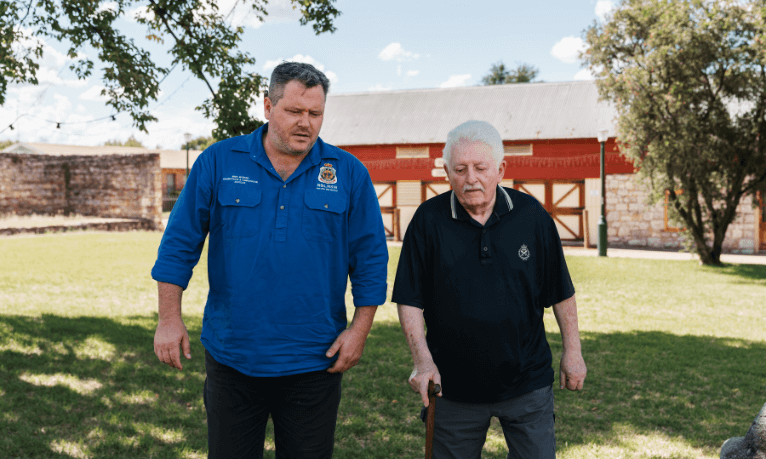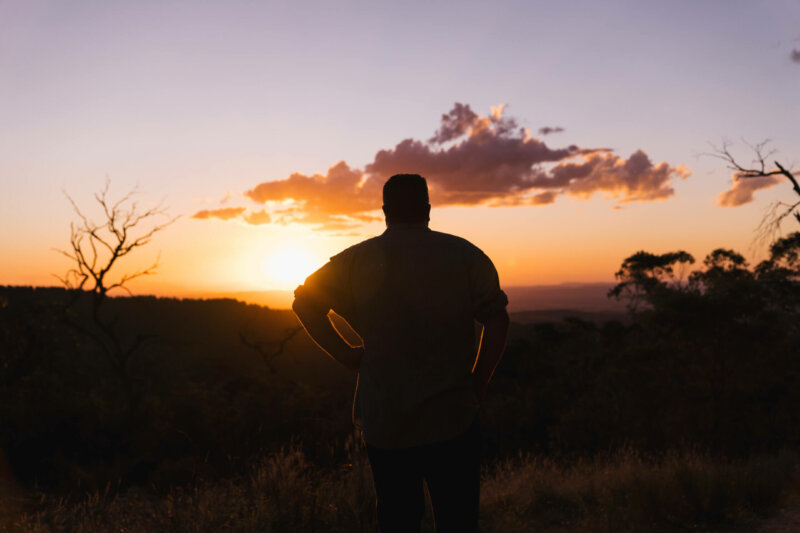Marc Mathews on connecting veterans with the support and services they need

By Girard Dorney
With the Wellbeing Support Officer project, RSL NSW is training volunteers to help veterans in need, no matter where they’re located.
Eight years after joining the Army, where he served in various capacities, including in East Timor, Marc Mathews received terrible news.
“I found out I had two skull base tumours, which had to be surgically removed,” he says. “So I had two massive surgeries to remove the diseased bone. Then I was medically discharged.”
Even if a veteran has no medical issues, leaving the service can be isolating and alienating, not to mention financially fraught. But Mathews had the most serious of medical histories, and found himself in Dubbo trying to navigate the various pieces of veteran compensation legislation to attain financial security.
So when he got an offer of help from someone who claimed to know how to apply for support through the Department of Veterans’ Affairs (DVA), he took it. Unfortunately, that person was not qualified.
“They didn’t actually know what they were talking about,” says Mathews. “So they put in an incorrect application, under the wrong [category].”

WSO and Molong RSL sub-Branch member Marc Mathews
Mathews wouldn’t learn for years what had gone wrong. From his perspective, all that happened was a typically drawn out, stressful experience took longer and was even more stressful.
His desire to make sure veterans avoided a similar fate saw him become a qualified Compensation Advocate under the Advocacy Training and Development Program (ATDP).
It’s also why he was thrilled to hear RSL NSW would be formalising the Wellbeing Support Officer (WSO) project and immediately agreed to be a trainer. Because when veterans need help, whether they seek it out or someone in the community raises a concern, it’s crucial that the person who responds knows what they’re doing.
Support, not advocacy
The essential letter in WSO is ‘S’ – support – because it defines both the mission and its limits.
“It’s intended to be an entry-level position for those looking to support other veterans,” says Bronte Pollard, RSL NSW Liaison Officer at the National Centre for Veterans’ Healthcare and WSO Trainer.
“If someone walks into their sub-Branch looking for help, you can be the person who finds out what’s troubling them. Or if there’s a veteran in hospital, you would reach out and see if there’s anything they need. Even if there’s someone the community knows is maybe a concern, you can jump in and do a wellbeing check.”

RSL NSW Liaison Officer and WSO Trainer Bronte Pollard
Of course, the RSL community has always had people who help others informally, and then there are those, like Mathews, who become accredited through the ATDP as Wellbeing Advocates or Compensation Advocates.
WSOs don’t undertake the many months of learning and casework that advocates do, but neither is the position casual. In fact, one of the success metrics of the RSL NSW Strategic Plan 2021-26 is to staff every sub-Branch with at least one WSO by the end of 2024.
“The training is essentially a one-day course that touches on essential skills and procedures,” says Pollard. “You’re looking at things like communication, active listening, the importance of self-care when caring for others, visitor etiquette in hospital and aged care facilities, privacy concerns, and how to manage a funeral service.”
Crucially, the WSO is not supposed to offer advice or try to directly address a veteran’s core issues.
“The role is to support, listen and refer,” says Mathews. “We’re not saying don’t help – you just need to know your left and right of arc. For instance, as soon as someone starts talking about compensation, the WSOs know they’re not covered by insurance and to pass the veteran on to an accredited advocate, either through a sub-Branch or RSL LifeCare Veteran Services.”
Perhaps the most important tool for a WSO is a network of contacts with the appropriate qualifications, including statewide institutions such as RSL LifeCare and local services for medical issues, counselling, housing services and so on.
No deed too small
Sometimes the referrals provided by WSOs can be profound. Mathews relays the story of a 73-year-old Malaya and Vietnam veteran receiving treatment for cancer in Orange.
“A WSO happened to be in the same clinic in Orange and he overheard the man saying he had been in the Navy. The WSO went up and said, ‘Do you have compensation?’ The man replied he didn’t, and the WSO said, ‘You need to talk to Marc in Molong, because you’re entitled to something.’ So he referred him to me, we got in touch, and we sent off the claim to DVA to receive his Gold Card.
“The Gold Card meant he could receive the remainder of his cancer treatment in the private sector and he got reimbursed for accommodation and travel, and his wife was able to go with him into treatment. Sadly, he passed away a year and half after. But he did actually say when he got the card that it was one of the most rewarding feelings he’d had – that people went out of their way to help.”

“Everyone is working together to make others feel welcome and supported.”
When and how veterans served doesn’t merely change the types of compensation they can receive, it has a marked effect on whether they believe they deserve support at all. Graham says he sees this with both RSL members and non-members.
“For every suffering RSL member we help, I probably have another four veterans suffering who aren’t members,” says Mathews. “A lot of them served in the ‘Great Peace’ post-Vietnam and they don’t feel as though they should be in the RSL, let alone marching.”
Looking forward
Why the first batch of volunteers have put their hands up to be WSOs is no mystery.
“The reason a lot of veterans joined Defence in the first place is they have an ingrained sense of camaraderie and a desire to serve,” says Pollard.
To be sure, for many WSOs the position itself – and the help they provide to their community through it – is the goal. But for others, it’s a stepping stone towards being able to provide even more assistance by achieving accreditation through the ATDP pathways.
“I would say that of the people we had in our first training course, 50 per cent said they had their eye on that,” says Pollard.
The pipeline works the other way too. Those who’ve benefited from RSL NSW support, or from the veteran community in general, are volunteering.
“I have endless lists of people who’ve engaged with RSL NSW and who we’ve provided wellbeing support to, and now they’re starting to put their hands up to be WSOs,” adds Mathews.

Marc Mathews is one of a growing number of WSOs in NSW.
Given the scope of any particular WSO’s responsibilities and their own limited time to devote to the role, the plan is for there to be crossover so that no sub-Branch is overwhelmed. WSOs will be able to reach any and all veterans living around the local area as part of what RSL NSW calls the ‘hub and spoke’ model of delivery.
If the project is to attain the success RSL NSW seeks, then it’s going to take a groundswell of veterans to fill in all the gaps.
Mathews, for one, is not concerned.
“We are a community of veterans and we are a culture,” he says. “That’s what’s starting to kick in. Everyone is working together within the community to make others feel welcome and supported.”






